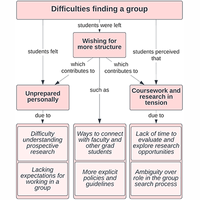Physics Ph.D. student perspectives on the importance and difficulty of finding a research group
IF 3.6
2区 教育学
Q1 EDUCATION & EDUCATIONAL RESEARCH
Physical Review Physics Education Research
Pub Date : 2024-05-07
DOI:10.1103/physrevphyseducres.20.010136
引用次数: 0
Abstract
Joining a research group is one of the most important events on a graduate student’s path to becoming an independent physics researcher and earning a Ph.D. However, graduate students’ perspectives on the experience of finding a research group are not well documented in the literature. Understanding these perspectives is crucial for evaluating whether departments are providing students with adequate support while they search for a research group, and how difficulties during this process contribute to attrition. Semistructured interviews with first and second year physics Ph.D. students reveal that incoming graduate students see joining a research group as a significant decision, and recognize that it may impact whether they will be able to complete the program. We found that students who struggled to find a group felt isolated and worried about falling behind their peers, whereas students who were able to immerse themselves in a positive group environment reported increased sense of belonging in their programs. The process of finding a research group often held differential importance for students identifying as women and nonbinary, who at times reported having to deprioritize their preferred research topic in order to be part of a more inclusive working environment. Although incoming graduate students characterized joining a research group as a significant decision, they often felt unprepared to make it. Moreover, they perceived an overall lack of guidance and structure from their departments, and characterized coursework as a barrier to searching for a group. Our findings suggest that providing students with better support during their group search process could help improve retention, particularly for traditionally underrepresented students, and improve students’ overall satisfaction in their graduate programs.

物理博士生对寻找研究小组的重要性和困难的看法
加入研究小组是研究生成为独立物理研究人员并获得博士学位的道路上最重要的事件之一。然而,文献中并没有很好地记录研究生对寻找研究小组的经历的看法。了解这些观点对于评估院系是否在学生寻找研究小组的过程中为他们提供了足够的支持,以及在这一过程中遇到的困难是如何导致学生流失的至关重要。对 20 名物理博士一年级和二年级学生进行的半结构式访谈显示,研究生新生认为加入研究小组是一个重要的决定,并认识到这可能会影响他们能否完成学业。我们发现,苦于找不到小组的学生会感到孤立无援,担心落后于同龄人,而那些能够融入积极的小组环境的学生则表示,他们在项目中的归属感增强了。对于女性和非二元身份的学生来说,寻找研究小组的过程往往具有不同的重要性,她们有时会说,为了成为更具包容性的工作环境的一部分,她们不得不放弃自己喜欢的研究课题。尽管研究生新生认为加入研究小组是一个重要的决定,但他们往往觉得自己没有做好准备。此外,他们还认为自己所在的院系在整体上缺乏指导和组织,而且课业也是他们寻找研究小组的一个障碍。我们的研究结果表明,在学生寻找课题组的过程中为他们提供更好的支持有助于提高他们的保留率,尤其是对那些传统上代表性不足的学生,同时还能提高学生对自己研究生项目的整体满意度。
本文章由计算机程序翻译,如有差异,请以英文原文为准。
求助全文
约1分钟内获得全文
求助全文
来源期刊

Physical Review Physics Education Research
Social Sciences-Education
CiteScore
5.70
自引率
41.90%
发文量
84
审稿时长
32 weeks
期刊介绍:
PRPER covers all educational levels, from elementary through graduate education. All topics in experimental and theoretical physics education research are accepted, including, but not limited to:
Educational policy
Instructional strategies, and materials development
Research methodology
Epistemology, attitudes, and beliefs
Learning environment
Scientific reasoning and problem solving
Diversity and inclusion
Learning theory
Student participation
Faculty and teacher professional development
 求助内容:
求助内容: 应助结果提醒方式:
应助结果提醒方式:


